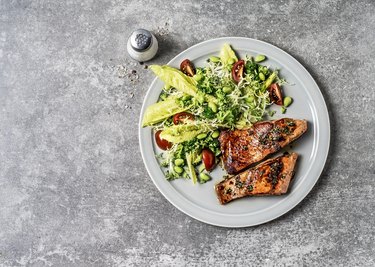
If you have high cholesterol, your diet might be the culprit. Low-cholesterol protein sources, such as beans, nuts and fish, as well as foods high in fiber, are an important part of a heart-healthy diet. Foods rich in plant-based proteins and low in saturated fats are your best bet.
Tip
Low-cholesterol foods are often also low in saturated fat, which helps keep your heart healthy. A diet rich in plant-based proteins, such as beans and nuts, as well as fish and plenty of fiber, helps keep your cholesterol levels within normal limits.
Video of the Day
Low-Cholesterol Diet Plan
You may be surprised to find out that it's not the cholesterol in the food you eat that affects blood cholesterol levels, but the saturated fat. An August 2015 review in the American Journal of Clinical Nutrition confirmed that dietary cholesterol has negligible effects on blood cholesterol levels. In fact, Harvard Medical School reports that the 2015-2020 Dietary Guidelines for Americans have eliminated the recommendation to limit dietary cholesterol to 300 milligrams per day.
Video of the Day
Foods that are rich in saturated fat, such as red meat and dairy, are often high in cholesterol as well. The best low-cholesterol diet plan to improve your blood lipids is one that is high in fiber and low in saturated fat, with foods like fish, vegetables and whole grains.
High cholesterol does contribute to heart disease, but other factors play a role, too. High blood pressure, inflammation, smoking and have obesity are just a few examples. Although eating the right foods may keep your heart healthy, some people also need medications to help control their cholesterol levels or blood pressure.
Read more: What to Eat to Lower LDL Cholesterol Quickly
Fill Up on Plant Proteins
Protein is an important part of your diet. It helps your body build and repair tissues, preserves lean mass and supports general health. When combined with exercise, its benefits are even greater. Before deciding what kind of protein to eat, it's important to know how much of it you need on a daily basis.
The American Heart Association cautions against eating too much protein. As it turns out, individuals with high amounts of protein in their diet are more likely to have heart issues than those who consume smaller amounts. To find out how much protein you need, use this handy calculator from the USDA.
It is also important to know what kind of protein and low-cholesterol foods to eat. Plant-based protein sources appear to be more beneficial for cardiovascular health than animal foods. A February 2018 review in Trends in Cardiovascular Medicine suggests that diets rich in plant-based proteins, nuts, high-fiber foods and plant sterols may help lower cholesterol levels while improving blood pressure and overall heart health.
Read more: 9 Best Cholesterol Lowering Foods
Heart-Healthy High-Protein Foods
Infuse your diet with these low-cholesterol foods that contain heart-healthy fats and fiber. Both of these may help lower your bad LDL cholesterol levels.
Most nuts and legumes, which are plant-based protein sources, support cardiovascular health, points out Harvard Medical School. Plus, they contain no cholesterol. Here are some examples:
- Black beans (7 grams of protein per half-cup)
- Garbanzo beans (5 grams of protein per half-cup)
- Edamame (9 grams of protein per half-cup)
- Whole almonds (15 grams of protein per half-cup)
- Cashews (5 grams of protein per quarter-cup)
Aim for at least two servings of fish or shellfish per week to get more omega-3s in your diet, recommends Harvard Medical School. Eat more of the following:
- Salmon (30 grams of protein and 70 milligrams of cholesterol per serving —3.5 ounces)
- Tuna steak (40 grams of protein and 76 milligrams of cholesterol per 3.5-ounce serving)
- Oysters (7 grams of protein and 3 milligrams of cholesterol per quarter cup)
Poultry is a good source of protein and has less saturated fat than red meat.
What about eggs and dairy? Harvard Medical School reports that an egg a day is safe for your heart unless you have diabetes. If you do, try not to exceed three eggs per week. For dairy products like milk, yogurt and cheese, stick to just one or two servings per day.
Beware — a low-cholesterol diet plan should exclude processed meats, such as bacon and hot dogs. Limit red meat to one serving per week.
- American Journal of Clinical Nutrition: "Dietary Cholesterol and Cardiovascular Disease: A Systematic Review and Meta-Analysis"
- Harvard Health Publishing: "Cholesterol and Heart Disease: The Role of Diet"
- American Heart Association: "When It Comes to Protein, Quality Is More Important Than Quantity"
- Trends in Cardiovascular Medicine: "Plants Based Diet and Cardiovascular Health"
- Harvard Medical School: "Protein: Which Sources Are Best For Your Heart"
- USDA: "Black Beans"
- USDA: "Tuna Steak"
- USDA: "Garbanzo Beans'
- USDA: "Edamame"
- USDA: "Almonds"
- USDA: "Cashews"
- USDA: "Salmon"
- USDA: "Oysters"
- USDA: "Chicken Breast"
- USDA: "Turkey Breast"
- USDA: "Egg- Whole, Boiled or Poached"
- USDA: "Whole Milk"
Was this article helpful?
150 Characters Max
0/150
Thank you for sharing!
Thank you for your feedback!